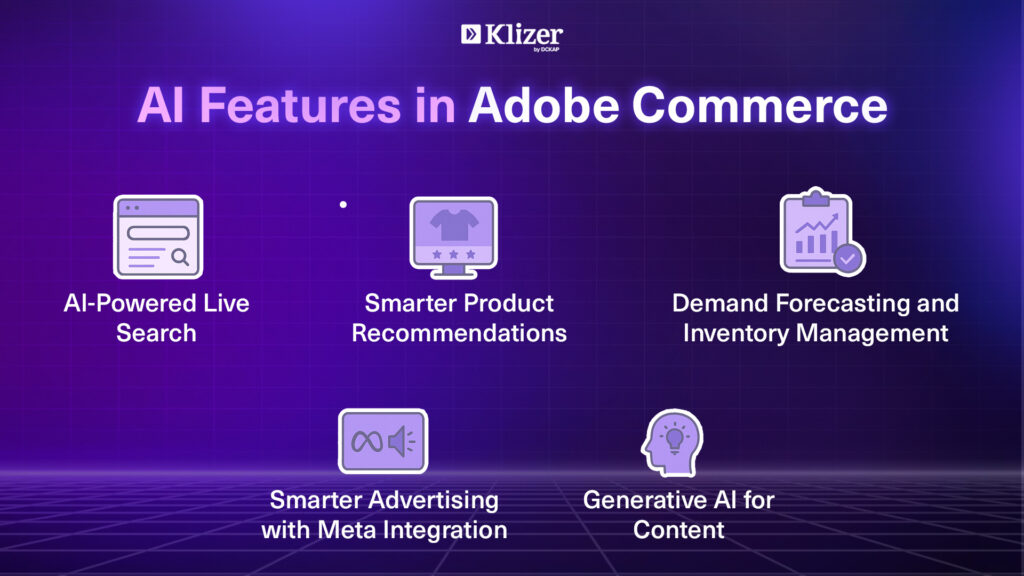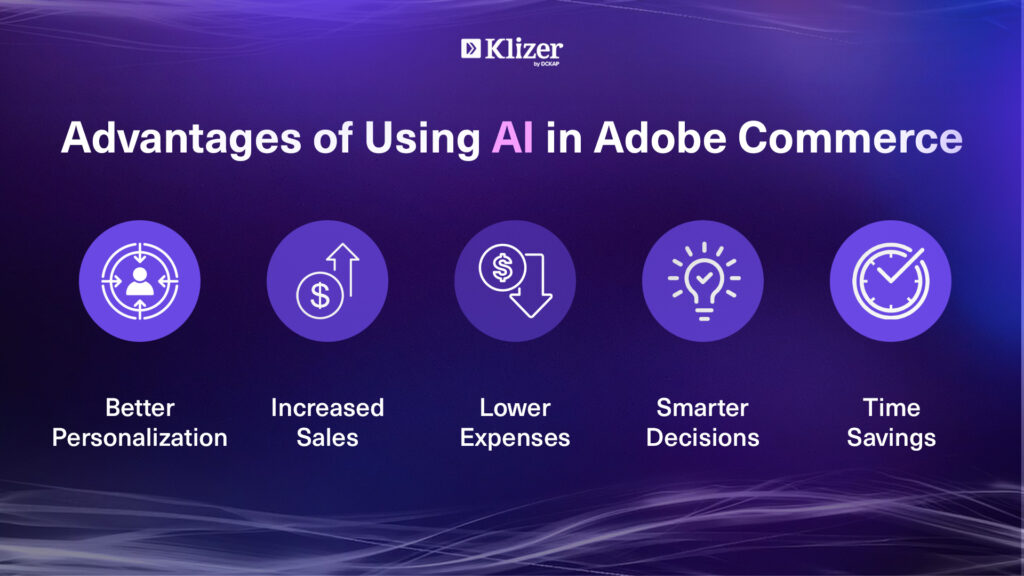For millions of people, online shopping is a daily routine. Today’s customers expect websites to be fast, user-friendly, and personalized for them. Lacking any one of those features, users abandon the site without a second thought.
This is where Artificial Intelligence (AI) comes in. In Magento, now Adobe Commerce, the AI solutions powered by Adobe Sensei help businesses with managing inventory, running marketing campaigns, and creating personalized shopping experiences.
In this blog, learn how AI supports marketing automation in Adobe Commerce, why it matters, and the benefits it brings to businesses as well as customers.
ON THIS PAGE
Understanding AI in Marketing Automation
Marketing automation is the use of software to execute repetitive marketing operations like email marketing, product recommendations, and ad placements. AI enhances this aspect by learning from customer data and making informed decisions.
For instance:
- AI can send tailored emails to each customer instead of sending out the same email to everyone.
- Instead of guessing which product to show on the homepage, AI can display products that are more likely to attract customers.
The result is smarter marketing that feels less robotic and more human.
The Role of AI in eCommerce
eCommerce industry is quite competitive. Shoppers leave your site right away if they do not quickly get the products they are searching for. So, businesses need to connect with them in the right way, at the right time, which is one of the biggest challenges for them. AI plays an important role by targeting users during the perfect time.
Here are the two stats that show the importance of AI in ecommerce:
- AI personalization can increase company revenue by as much as 40%.
- AI chatbots can recover about 35% of abandoned shopping carts.
These numbers show that AI does much more than streamline operations, it improves sales and also helps satisfy customers.
Recommended Read: How Can Adobe Sensei Features Work for Personalized Marketing for B2B eCommerce?
AI Features in Adobe Commerce
Adobe Commerce has built-in AI tools that aim at making the shopping experience better for customers and simpler for businesses. Let’s look at some of the key features.

1. AI-Powered Live Search
Finding the right product is one of the biggest challenges for online shoppers. It is made easier in Adobe’s Live Search, which uses AI to interpret what users are trying to say, even when the words are very short or unclear.
For instance, if a customer types “running,” the AI can interpret and suggest “running shoes,” “sportswear,” or “fitness accessories.” This speeds up shopping and reduces shopping cart abandonment.
2. Smarter Product Recommendations
In Adobe Commerce, AI-driven product recommendations stand out as the most useful tools. Rather than showing random products, the tool takes into account the user’s shopping and browsing history and looks for products that the customer is most likely interested in.
For instance:
- If someone buys a phone, the system suggests covers, chargers, or earphones.
- If a customer adds a dress to the cart, it may show matching shoes or accessories.
These personalized recommendations increase the chances of sales by providing customers a more personal experience.
3. Demand Forecasting and Inventory Management
Running out of stock or holding too much inventory can negatively impact your business. Adobe Commerce uses AI to analyze customer behavior, past sales, including seasonal trends. This helps predict future demand.
For instance:
- If sales of jackets usually rise in November, AI can adjust stocks beforehand.
- If a product is selling slowly, businesses can reduce stock orders to avoid waste.
This makes inventory smarter and ensures customers find what they need when they need it.
4. Smarter Advertising with Meta Integration
Adobe Commerce integrates with Meta’s Advantage+ Shopping Campaigns that use AI to optimize ad testing. It helps businesses reduce wasteful spending and improves the ROI of advertising campaigns. For small and medium enterprises, this feature is especially useful, as it increases the return on investment for every rupee spent on advertisements.
5. Generative AI for Content
It is a known fact that creating marketing content takes a lot of time. Now, Adobe has an AI tool named Adobe Firefly that can create banners, images, and product visuals. This enables the marketing team to design new promotions without a large design team.
How AI Helps in eCommerce
The impact of AI is not limited to Adobe Commerce. AI is also used in ecommerce for:
- Chatbots that provide 24/7 support.
- Personalized email marketing that increases open rates.
- More advanced pricing strategies that consider demand and competition.
- Enhanced customer retention with customized shopping experiences.
Advantages of Using AI in Adobe Commerce
Adopting AI-powered marketing automation in Adobe Commerce enables businesses to take advantage of several advantages, such as:

- Better Personalization: Customers get suggestions and offers that align with their preferences.
- Increased Sales: Smart recommendations and ads lead to more purchases.
- Lower Expenses: Demand prediction and automated advertising help cut unnecessary spending.
- Smarter Decisions: Predictive analytics help plan marketing and inventory.
- Time Savings: Automation reduces manual work for marketing teams.
Conclusion
AI is now a must-have for online businesses. In Adobe Commerce, it helps with smarter search, personalized product suggestions, better stock planning, and more effective ads. This means more sales, lower costs, and a shopping experience that feels right for every customer.
To get the best results, it’s important to work with the right eCommerce Solutions. Using advanced AI solutions for eCommerce will help businesses meet customer needs today and grow stronger in the future.








